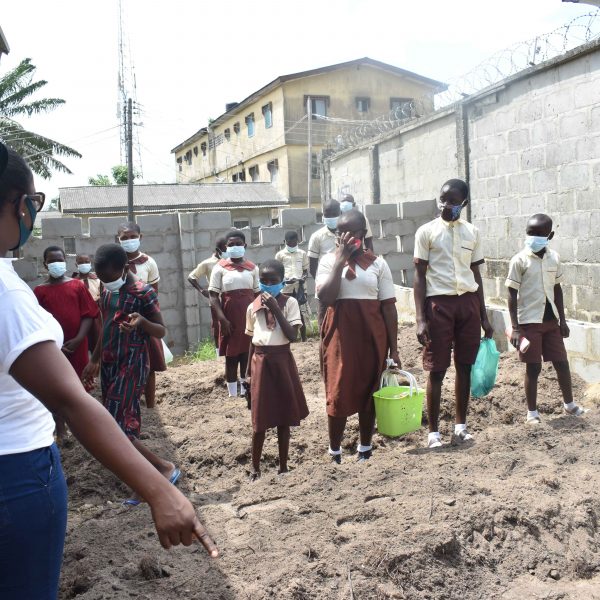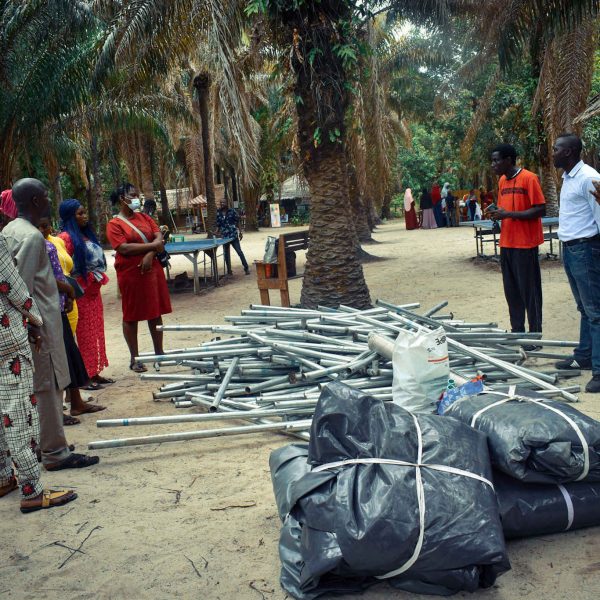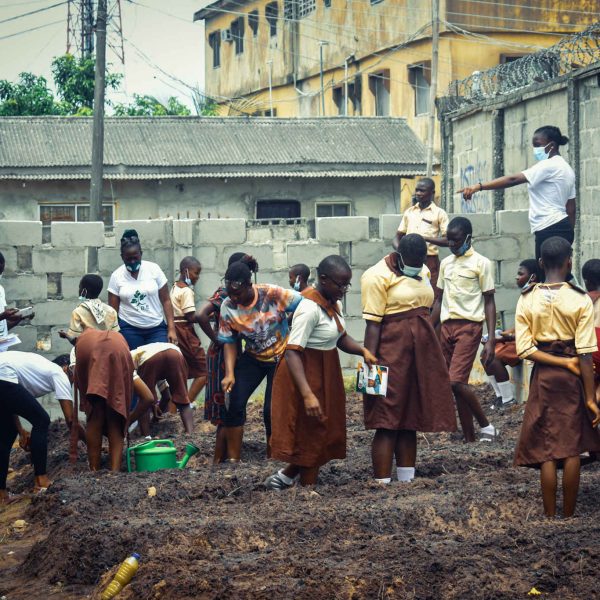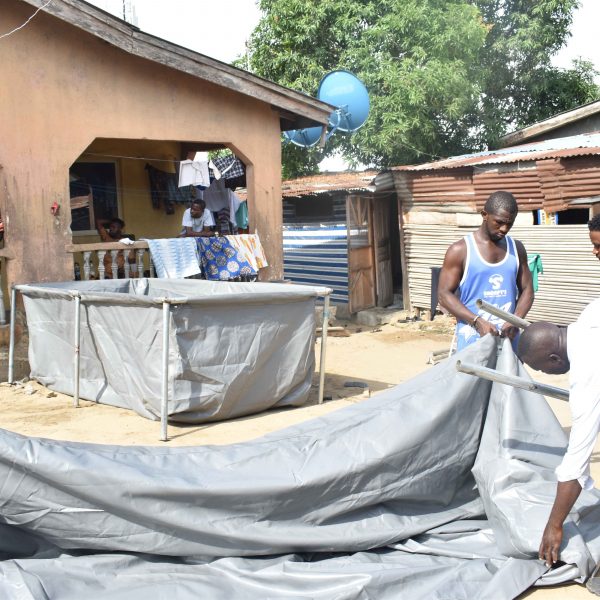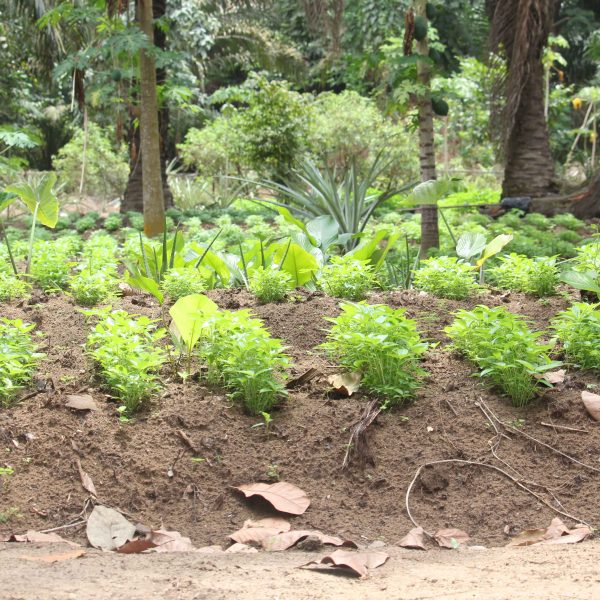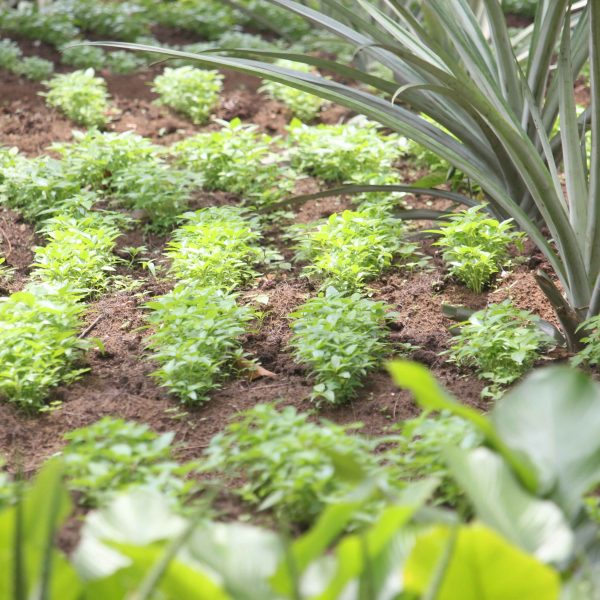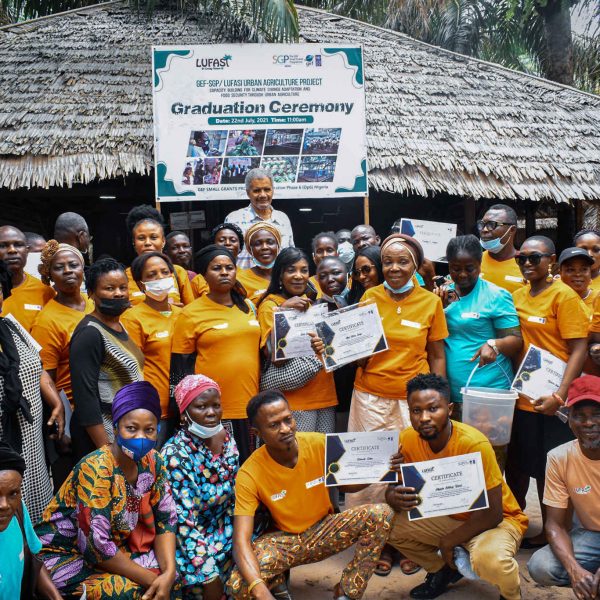Project Title: Capacity Building for climate change adaptation and food security through Urban Agriculture in Abijo, Ibeju Lekki LGA, Lagos, Nigeria
Project Location: Abijo community, Ibeju Lekki Local Government Area, Lagos State, Nigeria.
The current challenges posed by climate change and its link to urban poverty and food security in a big commercial city like Lagos, Nigeria poses a threat to its rural communities with their full dependence on the quality, cost and quantity of domestic food imports in the country. This project spearheaded by LUFASI in collaboration with the Global Environment Facility’s Small Grants Programme (GEF/SGP) will tackle food insecurity in the state by building capacity for climate change adaptation and food security in Abijo, Ibeju Lekki LGA, Lagos, Nigeria.
The project recognized the GEF-SGP’s sixth Operational Plan which was in need of innovative smart agricultural practices as one of the strategies for addressing climate change adaptation and indirectly addressing food security issues.
With this project, LUFASI aims to develop a model for innovative and smart agricultural practices in cities targeting mostly women and youth, including a ‘school farm and future demonstration project’ in the rural Abijo community in Ibeju Lekki LGA.
This project focuses both on an active community and a government policy model as well as a children demonstrative project. The Project targets 30 families (mostly women and youth) to be involved in skill acquisition and training on varied forms of innovative agriculture practices. The government policy inputs aims at achieving the development of an advocacy tool specifying urban agriculture for citizen education on food security while the children education model is a farm and future demonstration project as a pilot in the community school to form a component of the climate education for children.
The following are some of the specific project objectives;
Some of the expected results of the project include;
The project will bring the community closer to the practicality of urban agriculture in Lagos while tackling food insecurity as well as adapting to the effects of climate change. The Abijo rural community members (especially the women and youth) will overcome the dependence on food imports into the state as well as the space factor to be able to grow their own foods in boxes or even on their rooftops.
Link with GEF/SGP OP6 Outcomes and Objectives
This Project is in line with the GEF-SGP focal area on Climate Change and to some extent on Biodiversity. The Project is located within the Atlantic coast landscape recognized by the GEF-SGP sixth operational plan. The elements of the Project reinforce the importance of climate smart agriculture as an innovative strategy for environmental management and development. It is a component of the sustainable agriculture and fisheries as a focal point of the GEF-SGP as well as helping to catalyze sustainable urban solutions.
The Project is closely linked to similar efforts in Nigeria on climate change and biodiversity, most especially on capacity building and skills development on innovative agricultural practices. LUFASI will build a network of learning through exchanges and direct interaction with relevant GEF-SGP Grantees with such experiences during the implementation of our Project. The uniqueness of our Initiative is its urban community focus and its significance of linking policy to local action on climate change adaptation processes.
The Project is in line with the principles of Biological Diversity (CBD) and also in alliance with the National Biodiversity Strategic Action Plan (NBSAP). The Project is directly connected with Sustainable Development Goals 1, 2, 11, 13 and 15 which are No Poverty, Zero Hunger, Sustainable Cities and Communities, Climate Action and Life on Land respectively.
Conclusion
The Project goal is to enhance human capacity on food production in urban settlements and promote efficient utilization of urban waste, as a rationale for improving food security and adaptation to climate change.
Project Location: Abijo community, Ibeju Lekki Local Government Area, Lagos State, Nigeria.
The current challenges posed by climate change and its link to urban poverty and food security in a big commercial city like Lagos, Nigeria poses a threat to its rural communities with their full dependence on the quality, cost and quantity of domestic food imports in the country. This project spearheaded by LUFASI in collaboration with the Global Environment Facility’s Small Grants Programme (GEF/SGP) will tackle food insecurity in the state by building capacity for climate change adaptation and food security in Abijo, Ibeju Lekki LGA, Lagos, Nigeria.
The project recognized the GEF-SGP’s sixth Operational Plan which was in need of innovative smart agricultural practices as one of the strategies for addressing climate change adaptation and indirectly addressing food security issues.
With this project, LUFASI aims to develop a model for innovative and smart agricultural practices in cities targeting mostly women and youth, including a ‘school farm and future demonstration project’ in the rural Abijo community in Ibeju Lekki LGA.
This project focuses both on an active community and a government policy model as well as a children demonstrative project. The Project targets 30 families (mostly women and youth) to be involved in skill acquisition and training on varied forms of innovative agriculture practices. The government policy inputs aims at achieving the development of an advocacy tool specifying urban agriculture for citizen education on food security while the children education model is a farm and future demonstration project as a pilot in the community school to form a component of the climate education for children.
Project Goals, Objectives and Expected Results
The Project is focused on capacity building on urban agriculture in response to climate change and food security challenges in the growing rural settlements, like the rural Abijo Community Lekki Peninsula, Lagos, Nigeria.The following are some of the specific project objectives;
- To identify and train selected community members (mostly women and youths) in Abijo community on varied forms of urban agricultural practices including organic waste nutrient recycling, urban greening, roof-top farming, homestead agriculture and animal husbandry as a model for demonstrating. urban based solutions on climate change adaptation and food security.The Project begins with a target of 30 families in the Abijo community as a pilot, but has an endgame of reaching out to 120 families with the “Train the Trainer” method indirectly through information sharing and local networking.
- To develop a children’s model and supervise the establishment of a children’s farm in the Abijo Community Primary School through climate smart agriculture as a model for improving awareness on climate change mitigation through urban based solutions
- To develop advocacy tools to promote awareness on climate smart agriculture techniques and urban agriculture to the public.
Some of the expected results of the project include;
- The urban greening of the community and its school with several farm patches that will act as carbon sinkers to mitigate the effects of climate change. This will help in the reduction of erosion that the community faces.
- The capacity of the community to grow and provide food for other community members at a subsidized rate as compared to waiting on exorbitant goods.
- Presence of 2 advocacy tools to developed around Urban Agriculture and its for Lagos.
The project will bring the community closer to the practicality of urban agriculture in Lagos while tackling food insecurity as well as adapting to the effects of climate change. The Abijo rural community members (especially the women and youth) will overcome the dependence on food imports into the state as well as the space factor to be able to grow their own foods in boxes or even on their rooftops.
Link with GEF/SGP OP6 Outcomes and Objectives
This Project is in line with the GEF-SGP focal area on Climate Change and to some extent on Biodiversity. The Project is located within the Atlantic coast landscape recognized by the GEF-SGP sixth operational plan. The elements of the Project reinforce the importance of climate smart agriculture as an innovative strategy for environmental management and development. It is a component of the sustainable agriculture and fisheries as a focal point of the GEF-SGP as well as helping to catalyze sustainable urban solutions.
The Project is closely linked to similar efforts in Nigeria on climate change and biodiversity, most especially on capacity building and skills development on innovative agricultural practices. LUFASI will build a network of learning through exchanges and direct interaction with relevant GEF-SGP Grantees with such experiences during the implementation of our Project. The uniqueness of our Initiative is its urban community focus and its significance of linking policy to local action on climate change adaptation processes.
The Project is in line with the principles of Biological Diversity (CBD) and also in alliance with the National Biodiversity Strategic Action Plan (NBSAP). The Project is directly connected with Sustainable Development Goals 1, 2, 11, 13 and 15 which are No Poverty, Zero Hunger, Sustainable Cities and Communities, Climate Action and Life on Land respectively.
Conclusion
The Project goal is to enhance human capacity on food production in urban settlements and promote efficient utilization of urban waste, as a rationale for improving food security and adaptation to climate change.


